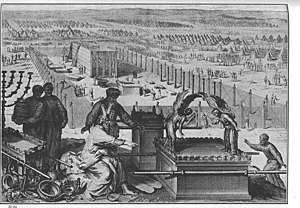 Image via Wikipedia
Image via WikipediaWhew! Reading these chapters brings to mind Westerns where a group of vigilantes go after some law breaker in order to hang him or just kill him outright. However, I don’t really believe that God condoned mob rule. Rather, God is cataloguing sin and reminding all of Israel
So, how does one escape the inevitable punishment of death? In prior chapters, individuals were told to the Tent of Meeting, lay a hand on the head of the animal to be sacrificed, confess their sin, and allow the animal to be sacrificed by a consecrated descendant of Aaron, as a sin offering. The sin that was repented of, God forgave. Unconfessed and unforgiven sin separated a person from God, both in this life and for eternity.
While we tend to think of sin as varying in degree – some not too bad; some socially acceptable; some indisputably heinous, God regards all sin as loosing one’s way. According to these chapters, all sin required punishment.
Fortunately, from yesterday’s readings, we saw how adamant God was about extending forgiveness to a people who deserve death. So, God put an extra responsibility for holiness upon the Levites because this tribe was charged with representing God’s judgment in Israel Israel
“Thus you are to be holy to Me, for I the Lord am holy; and I have set you apart from the peoples to be Mine.
Holy is the Hebrew קָדוֹשׁ (qadowsh) meaning to be set apart or hallowed or consecrated. The nation God created was designed to have a special witness to Him before the world. Israel alone saw God in the pillar of fire and saw His redemptive hand as He supernaturally delivered the sons of Jacob out of Egypt Israel
Only Israel

No comments:
Post a Comment